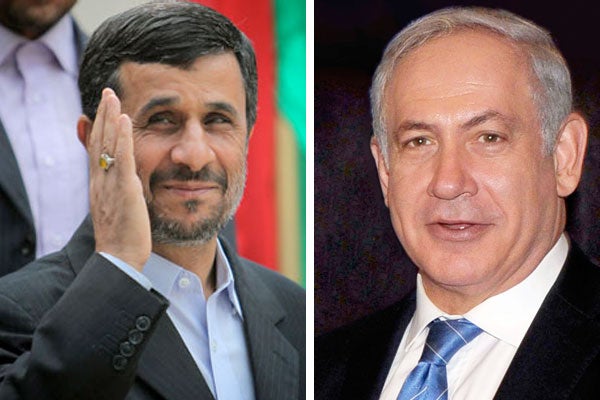Four years of President Obama’s foreign policy are having their full effect. After squandering time in sham “negotiations” with Iran and Palestine and abandoning Iraq to al-Qaeda, the President has made many situations more difficult—and urgent.
Iran is testing its ballistic missiles. We cannot afford to waste any more time. After the President downplayed a military option for more than three years, recent pressures—both practical and political—have caused the Obama Administration to become more hawkish on the Iran nuclear issue in recent weeks.
Secretary of Defense Leon Panetta, in Israel on a Middle East tour last week, called for international leaders to keep “maximum pressure” on Iran and warned that the United States “will not allow Iran to develop a nuclear weapon, period.” As Heritage’s James Phillips notes:
The Administration’s tougher rhetoric is in part a reflection of the fact that Iran has shrugged off international sanctions, refused to negotiate an acceptable resolution of the nuclear impasse, and continues to stockpile enriched uranium at an accelerating rate.
…Although the Administration has been quick to take credit for stronger sanctions on Iran, much of the impetus for sanctions has come from Congress, which has passed sanctions legislation by huge bipartisan majorities, sometimes over the objections of the Administration.
Congress, and slowly the Administration, is recognizing that the U.S. should broaden and deepen its cooperation with Israel on missile defense. We must share the costs of trying to make up the lost time when missile defenses were not pursued as a matter of policy.
In a new Heritage paper, Baker Spring lays out specifics for this cooperation and its funding. He notes that there is “strong bipartisan congressional support in favor of providing significantly more money for U.S.–Israeli missile defense cooperation than the Obama Administration originally proposed.”
Spring explains that the Administration must get past its outdated view of building up defense:
…strategic defenses generally, and missile defenses in particular, are essential contributors to a robust deterrence posture. This is a sharp departure from the prevailing Cold War view that strategic defenses were at best worthless and at worst destabilizing.
Under Obama’s leadership, America’s position in the Middle East has weakened considerably. We were unprepared for the “Arab Spring” uprisings, and the President’s response has been dangerously indecisive. For example, he continues to champion a Palestinian state while denouncing the current Syrian state—and the two are eerily similar. If Palestine were a state, it would be another corrupt enemy of Israel, our most important ally in the region, and would be a state sponsor of terrorism like Syria. While the Administration dithers on its Syria position, a growing Islamist extremist presence in that country presents the danger of an extremist dictatorship that becomes a base for international terrorism.
After abruptly pulling out of Iraq, the President must address a resurgence of al-Qaeda in Iraq (AQI) now threatening to attack the United States. An AQI leader has warned Americans: “You will soon witness how attacks will resound in the heart of your land, because our war with you has now started.” Several associates of the terrorist group have been arrested inside the U.S. and Canada in the last two years.
Sanctions and strong words are no longer enough. Israeli Prime Minister Benjamin Netanyahu has warned that time is running out for international efforts to end Iran’s nuclear defiance through diplomacy. Netanyahu said, “Things that affect our fate, our very existence, we don’t entrust to others—not even to our best friends.”
President Obama would do well to follow Netanyahu’s philosophy. The U.S. should commit to deploying the missile defense arsenal necessary to protect American interests both at home and abroad.
MORE:
“U.S.–Israeli Missile Defense Cooperation: Building on the Success of Iron Dome,” by Baker Spring
“If Israel Attacks” by James Phillips and James Jay Carafano
Quick Hits:
- The White House has indicated that President Obama will not make a new push for more gun control following recent shootings.
- New evidence suggests that the Treasury Department led the elimination of 20,000 non-union workers’ pensions—while union workers were well taken care of—in the government buyout of GM, reports The Daily Caller.
- Jamaican Usain Bolt, known as the world’s fastest man after winning gold again in the 100-meter dash, stopped an interview at the Olympics to give deference to the U.S. national anthem.
- What happens when 1,099 felons vote in an election that’s decided by just 312 votes? Proof that voter fraud is real—and a real problem.
- The Obama campaign and the Democratic National Committee filed a lawsuit to change Ohio’s voting law before the election—and it could cause problems for members of the military trying to vote. Heritage’s Hans von Spakovsky has details.
